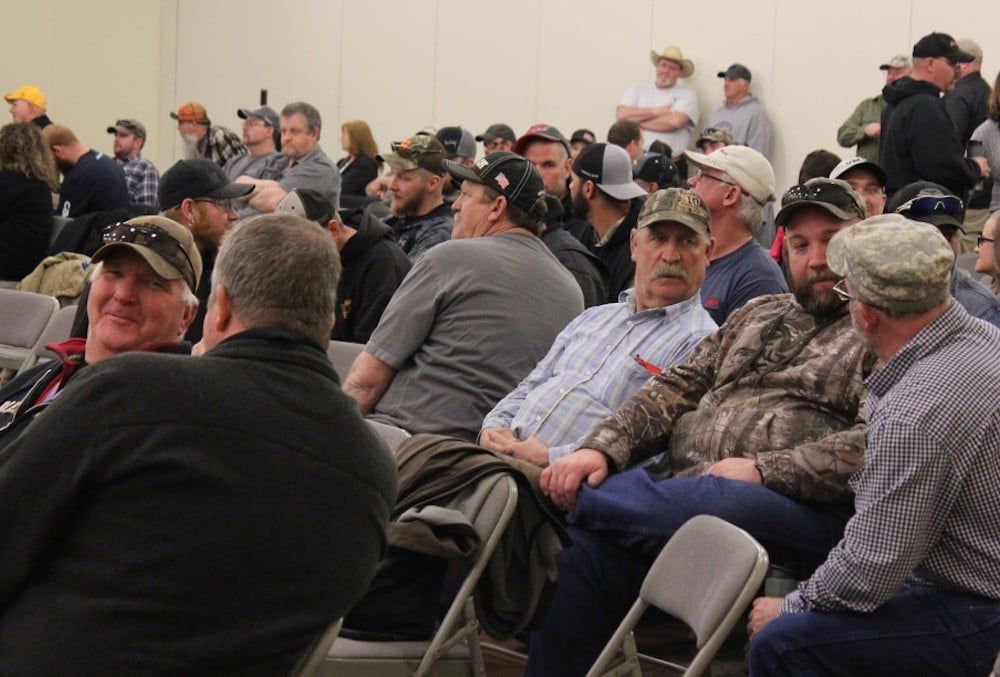Wyoming: Coal Firm Seeks End to Employee, Retiree Obligations in Kemmere

By Heather Richards
January 18, 2019 - The bankrupt coal firm that owns the Kemmerer mine has asked a bankruptcy judge in Texas for permission to kill retirement obligations for its former workers in Wyoming and nix the current contract between unionized miners in Lincoln County and the company, citing the difficult market for coal in the U.S. today.
Westmoreland Coal Co. is also looking to reject its collective bargaining agreement with its Beulah mine in North Dakota.

Kemmerer miners and UMWA members packed the South Lincoln Training and Event Center in Kemmerer on April 20 to hear contract negotiations between UMWA and Westmoreland leadership.
Obligations to workers, such as $70 million in medical benefits to retired miners that worked at Kemmerer, are not acceptable to potential buyers of the Kemmerer mine, Westmoreland’s lawyers argued in the filing Wednesday.
“The coal industry is troubled, and many coal-focused businesses have been forced to seek chapter 11 protection,” the lawyers stated. “Bankruptcy courts confronting this business reality have uniformly concluded that the coal business has fundamentally and permanently changed for the worse, forcing coal companies to modify their ... structure in order to survive.”
Owner of Kemmerer coal mine files for bankruptcy
The future viability of the Kemmerer mine post-bankruptcy is also vulnerable, the company stated, making the retention of expensive obligations to miners untenable.
Westmoreland tried to hold out against the headwinds facing coal, the lawyers said, but ultimately failed to do so. Now, it has no choice but to cut the retirement and benefit costs, lawyers said, noting that it had tried multiple times to compromise with the union on these cuts, both before and after filing for bankruptcy.
The stalking horse bidder refuses to take the Kemmerer mine with the contract in place.
“The debtors’ choice is stark: ask the court to grant the relief sought in this motion, or liquidate,” the lawyers argued.
The Kemmerer mine employs about 286 miners in Lincoln County. The mine’s main customer is the nearby Naughton power plant, owned by the utility PacifiCorp. Kemmerer also provides some fuel to local industries, including trona mining operations.
The plant and the mine are significant contributors to the local economy, both in terms of employment and tax revenue.
Westmoreland is the sixth-largest coal producer in North America, with operations in Canada, the American West and Ohio. The company’s assets across two Canadian provinces and six states secure about $1.1 billion in debt. It bought the Kemmerer mine from Chevron Mining Inc. in 2011.
The coal industry has struggled in recent years. Thermal coal, produced by Westmoreland for sale to power producers, has declined nationally from nearly half of the electricity mix in the U.S. 15 years ago to an anticipated 25 percent in 2020. That decline, coupled with heavy debt, led to the bankruptcy period in Wyoming in the Powder River Basin, which cut about 1,000 miners from the state’s workforce.
The dramatic decline in the coal market stabilized after the downturn but continues to face difficulty. Cloud Peak Energy, the third largest coal producer in Wyoming, recently announced it was considering multiple options for the company going forward, including a sale. The New York Stock Exchange warned the company last month that it risked a delisting due to poor stock performance. Cloud Peak also recently announced it was cutting benefits to retirees. Cloud Peak miners are not unionized.
The Kemmerer mine has been unionized for more than a century, represented by the United Mine Workers of America. Both current and former employees have rights secured through contract negotiations over those decades.
Prior to bankruptcy, Westmoreland notified the union that it would seek to undo the contract and cut benefits. The union resisted and has continued to fight in bankruptcy court. More than a dozen former miners at the southern Wyoming operation wrote letters to the bankruptcy judge in recent months pleading for both their health benefits and pensions. More recently, miners from Wyoming have showed up at Westmoreland’s offices in Denver to picket and protest.
Coal company's bankruptcy gets pushback from miners over health care benefits
In a December interview with the Star-Tribune, Mike Dalpiaz, vice president of UMWA District 22, which represents Kemmerer, said Westmoreland failed because it was bad at business, not because of the coal industry’s larger troubles.
The union has some experience in fighting for miner rights and would continue that tradition for the Kemmerer workers, former workers and their dependents, he said at the time.
“We are not a bashful bunch of people,” Dalpiaz said. “We’ve dealt with more of these coal bankruptcies in the last 15 years than we want to think about. We will fight this every single step of the way.”
Michael Duff, a labor law and bankruptcy expert at the University of Wyoming, said the Kemmerer case falls between two legal policies. There is the federal statute that governs employee benefits on the one hand. And then, sometimes in conflict with the first, there is bankruptcy law, which is structured to allow companies an avenue to emerge and continue as a viable entity.
“These two policies clash obviously and the question is what leeway does the company have in bankruptcy,” he said. “A lot of folks feel like the courts are much too employer-friendly in these situations, but what people forget is when a court is operating in that context, their real object is the survival of a company.”
The court is not an expert in industry. So, when Westmoreland makes an argument that the coal industry is struggling and that the company cannot carry the employee benefit encumbrances, a judge may defer to that industry expertise coming from the company in bankruptcy.
Or it could not.
A hearing has been set for Westmoreland to provide evidence in favor of terminating its contract with the miners on Feb. 4 in Houston. Either side could appeal the result of that decision in court, and there are employee benefits that may still be protected under federal statutes regarding labor.
Westmoreland Coal exec resigns after receiving hefty bonuses in lead-up to bankruptcy
“It gets tricky as a matter of law,” Duff said.
The overlapping laws and statutes here are complex. But often what takes place is that the length and costs and complexity of the disputes drive both sides to some sort of an agreement, Duff said.
“That’s really tough medicine,” he said of the possible erosion of union agreements. “What you want to say is, ‘Wait a minute. There was a contractual understanding. We had a deal, and it feels like the company is completely reneging on this deal.’”

